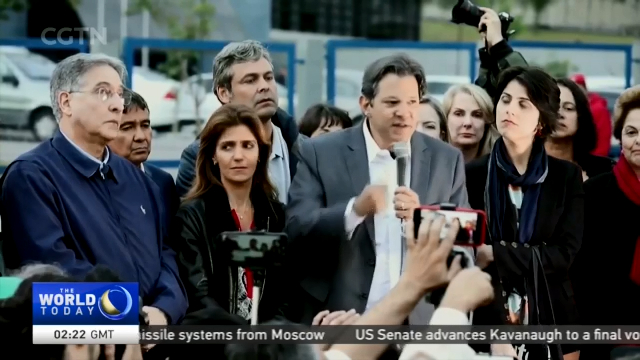
12:03, 06-Oct-2018
Brazil Politics: A look at leftist Brazilian presidential candidate Fernando Haddad
Updated
11:56, 09-Oct-2018
03:54

Turning to Brazil now, the country's presidential vote is just around the corner. Opinion polls suggest Fernando Haddad will finish second on Sunday - and advance to the second round run-off. Haddad is trying to break away from the shadow of Lula da Silva, AND benefit from the popular ex-president's support. CGTN's Paulo Cabral profiles the Workers' Party candidate.
Fernando Haddad is only here - running for president - because former president Luiz Inacio Lula da Silva couldn't be. The former mayor of Sao Paulo only became the Workers' Party candidate after the electoral court barred Lula from running. His opponents say he's just a stand in - and that Lula da Silva would effectively run the country from jail, where's he's serving a 12-year sentence on corruption charges.
FERNANDO HADDAD WORKERS' PARTY PRESIDENTIAL CANDIDATE "We were all given a mission by former President Lula. The mission of looking into the eyes of the people and help them to remember the good days we lived because we built together a different country. And we'll tell the people: we fell the same pain. But it's not time to go back home head down. But hold our heads high up and win this election."
His former deputy mayor, a current Communist Party official, argues that Haddad would serve as the head of a larger political movement.
NADIA CAMPEAO FORMER DEPUTY MAYOR OF SAO PAULO "This will be a government representing a project for Brazil, of a group of political forces. And Lula is the biggest representation of this project, that includes parties like the Workers' Party and the Communist Party of Brazil. Fernando Haddad has his own qualifications to run a fantastic government, but I think he will always take Lula's opinion into account."
Before entering politics, the 55-year-old Haddad was a university professor with a degree in law, a master's degree in economics and a doctorate in philosophy. Paulo Arantes was his academic adviser during his Ph.D. studies at the University of Sao Paulo.
PAULO ARANTES PROF. OF PHILOSOPHY, UNIVERSITY OF SAO PAULO "When he was doing his PhD his father fell ill and he had to take over the family business, which was a fabric wholesale shop. I remember him complaining about that. He was exhausted from reading until late at night after he closed the family's shop."
After earning his PhD in 1996, Haddad ran the family business and taught at the university before entering politics. His first high-profile position was as Education Minister in Lula da Silva's government in 2005. He would go on to win his first run for office in 2012- as mayor of Sao Paulo. But four years later he lost his reelection bid.
PAULO CABRAL SAO PAULO "Fernando Haddad's conciliatory style and modern image were key elements in the choice of his name to run for the Workers' Party. And he has a big advantage in not having been touched by the corruption probes that hit his party and put many of its officials in jail, including former president Lula da Silva."
If Haddad does reach the second round, a big question is whether his clean past would be enough to overcome the disappointment and disdain felt by much of Brazil's society - toward the Workers' Party - known as PT.
CLAUDIO COUTO PROF. OF POLITICAL SCIENCE, GETULIO VARGAS FOUNDATION "In Brazil today we have a clear-cut division in the society. A sector that hates PT and I think this is a problem. It's a kind of irrational hate against PT. It's very divisive and so some people think that they won't vote for PT, it doesn't matter what can happen. It will be very difficult for him if he doesn't establish bridges between PT and the other parties of the center."
Winning the election won't be easy for Fernando Haddad -- but if he does, what comes next would likely be even more challenging: Leading a country deeply hurt and divided by political and economic crises - and forging a unifying path forward. Paulo Cabral, CGTN, Sao Paulo.

SITEMAP
Copyright © 2018 CGTN. Beijing ICP prepared NO.16065310-3
Copyright © 2018 CGTN. Beijing ICP prepared NO.16065310-3